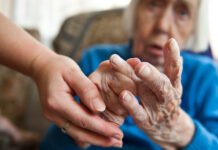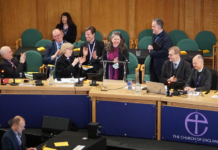
1. We, the Primates of the Anglican Communion, met at Lambeth Palace in London, from 28 to 31 March 2022, at the invitation of the Archbishop of Canterbury, the Most Reverend and Right Honourable Justin Welby, and his wife Mrs Caroline Welby. We extend our gratitude to Archbishop and Mrs Welby for their warm welcome into their home.
2. As Primates in the Anglican Communion, our primary calling is to follow Jesus’ command to the church to “go and make disciples of all nations, baptizing them in the name of the Father and of the Son and of the Holy Spirit” (Matthew 28:19).
3. This meeting was our first opportunity to gather in-person since the Primates’ Meeting in Jordan in January 2020. We have benefited from meeting online twice since then, but we wish to express how wonderful it is to be able to meet, once again, face to face.
4. We deeply regret that, because of the continuing effects of Covid in parts of the world, some of our number could not gather in person. We are particularly aware of the situation in the Province of Melanesia, where Vanuatu and the Solomon Islands are experiencing, for the first time, a severe outbreak of Covid. We pray for them and all who have suffered and who continue to suffer or grieve as a result of the pandemic.
5. We are thankful that many primates who could not join in person were able to join the meeting online for our business sessions. We look forward to the time when we can all gather safely.
6. We continue to lament the absence from our meetings of three primates who choose to stay away. Our reflections, deliberations and fellowship are diminished by their absence. We miss them and their prayerful wisdom, and we long for the time when we will all meet together.
7. The prime purpose of our meeting was to pray and reflect together on our identity in Christ in an attitude of pilgrimage. The Archbishop of Canterbury offered us biblical reflections on leadership from John’s Gospel and we reflected on the capacity and ability of our global Communion, working together, to meet the many challenges facing the world at this time.
8. Our Bible studies on 1 Peter helped us to prepare for the Lambeth Conference, which will take place in Canterbury in July and August this year. We were given a presentation outlining the programme for the Conference. After a two-year delay due to Covid restrictions, we are excited about gathering together in person with more than 700 other bishops of the Anglican Communion for prayer, Bible study, fellowship, and encouragement. Our hope and prayer is that our time in Canterbury will produce fruit that will enable the Anglican Communion to live as “God’s church for God’s world”.
9. We were conscious that, as we gathered in London, many people in the world are in a time of turmoil. We are particularly aware of the humanitarian crisis and other catastrophic effects of Russia’s invasion of Ukraine. We call for an immediate ceasefire and the withdrawal of Russian troops from Ukraine. We know, from our experience in the different parts of the world we are from, that conflict causes lasting damage. The longer a war goes on, the longer it takes to heal shattered relationships and bring about reconciliation.
10. We are also aware of conflicts in many other parts of the world, including Afghanistan, Eritrea, Yemen, Syria, Sudan, Mali, Congo, the Holy Land, Myanmar, Bangladesh, Central America, and South Sudan, and many others; and terrorism in Mozambique. These have forced many people to flee their homes. We recognise the plight of refugees, migrants, and displaced people around the world as one of the major tragedies of our time. We pray for peace and urge those with the ability to do so to bring about justice, sanctuary, and reconciliation.
11. We are also aware of the worsening disaster of climate change and its effects on millions of people around the world – not least the thousands of people in Madagascar and Mozambique, where four cyclones in two months have resulted in thousands of people being made homeless, and infrastructures and crops destroyed. Environmental damage affects the most vulnerable people in the world, including indigenous peoples who are affected by the exploitation of forests and others natural resources. We urge an end to the destruction of the Amazon from mining and logging.
12. During our meeting, we discussed proposals from the Church of England for greater Anglican Communion involvement in the choice of future Archbishops of Canterbury, and the large majority of the primates were generally supportive of the direction of travel.
13. As we gathered we were able to talk and hear about the burdens we each face in our provinces and home regions.
14. We reiterate that the Episcopal / Anglican Province of Alexandria, spread across 10 countries in North Africa and the Horn of Africa, is a full member Church of the Anglican Communion. The Diocese of Egypt is an integral constituent part of this Church. We stand with Archbishop Samy Fawzy Shehata and support him and the Diocese of Egypt in their efforts to maintain the legal recognition in Egypt of the Episcopal / Anglican Province of Alexandria.
15. We are concerned by the unilateral decision to construct the Grand Ethiopian Dam and the potential for water shortage in Egypt and Sudan that may result from it. We strongly believe the Blue Nile is God’s gift to the countries through which it flows and should therefore be a reason for cooperation between Ethiopia, Sudan, and Egypt to achieve sustainable development. We wish to appeal to the three countries to resume, with good will, their negotiations immediately to ensure a fair distribution of the water of the Blue Nile.
16. We are also concerned at the continuing misuse of blasphemy laws in Pakistan to unfairly target religious minorities, including Christians. The laws are being used to defend malicious prosecutions, beatings, and the forced conversion and “marriages” of young girls. We appeal to the government of Pakistan to bring about legislative change to outlaw these abuses.
17. We are concerned by the increasing use of “fake news” and false reporting. Such practices have a dangerous impact on democratic processes and can be used to defend unjust wars and conflicts. We call on everyone – especially politicians, campaigners and all Christian people – to reflect on the commandment not to bear false witness and to adopt this commandment when making public statements.
18. The post-covid and war-generated rise in prices of basic necessities is a great concern for the primates in its impact for the poor. We are alarmed by increasing levels of hunger in the world. Eating is a human right and it is a Christian duty to ensure that all are fed. We call on governments and civil society organisations around the world to prioritise food security and distribution to ensure that all have access to food. The need is urgent. Hungry people can’t wait.
19. At our last in-person meeting, we had the privilege of visiting the Holy Land Institute for the Deaf in Jordan and were inspired by the work of the staff there. We are grateful for the gracious hospitality of the Hashemite Kingdom of Jordan, the Episcopal Province of Jerusalem and the Middle East.
20. We were deeply disappointed not to meet in Rome, but we leave London refreshed and spiritually renewed, thankful for the opportunity to connect again with each other. As we return to our home Churches, we do so knowing that we will gather again, soon, with our brother and sister bishops at the Lambeth Conference. We encourage all bishops in the Anglican Communion to attend this important gathering.
21. We are very grateful to the staff from the Anglican Communion Office and Lambeth Palace who provided practical support to our meeting; and to the Community of St Anselm and the Chemin Neuf Community who surrounded us with prayer.
22. We return to our Churches and dioceses conscious of the calling that is given to us by God, through Jesus Christ, and of our need for grace. We have reflected on the servant leadership of Christ and our own roles as shepherds of his flock, and on St Peter’s exhortation to “tend the flock of God that is in your charge, exercising the oversight, not under compulsion but willingly, as God would have you do it” (1 Peter 5.2).
31 March 2022



[…] Izvor: anglican.ink […]